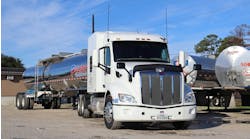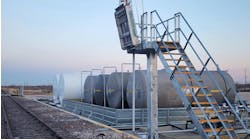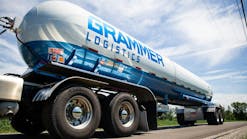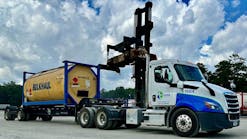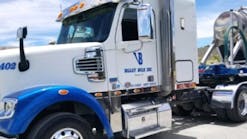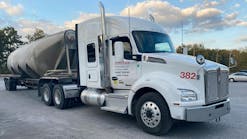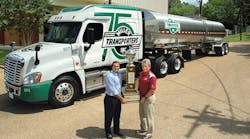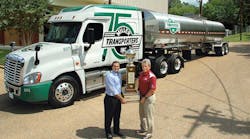Outstanding safety performance brings Miller Transporters top accolade as one of the safest tank truck carriers
MILLER Transporters Inc just picked up its second National Tank Truck Carriers Outstanding Safety Performance Trophy in nine years. It couldn’t have come at a better time.
The Jackson, Mississippi-based chemical hauler recently began celebrating its 75th anniversary. Top management makes it clear that safe performance has been a priority throughout the company’s more than seven decades in business.
“We’re here to celebrate our 75th anniversary because of our safety culture,” says Lee Miller, Miller Transporters president. “Safety and longevity go hand in hand. We won our first Outstanding Safety Performance Trophy for our record in 2006, and the latest one was for our performance in 2015.
“These trophies affirm our mission to put safety above everything else. The two trophies are symbolic recognition of two great years in safety. We want that level of safe performance every year. We calculate our performance metrics on achieving award-winning safety every day, every month, and every year. This latest trophy is proof that our drivers have fully bought into our safety program.”
Reinforcing safety
Brent Cobb, vice-president of safety and quality for Miller Transporters, adds: “We were very excited to receive this recognition from NTTC. At the beginning of 2014, Miller’s safety department set out to reduce our DOT accident frequency by concentrating efforts in three specific areas. First was conducting more one-on-one training with all new drivers. Next, we began working with drivers showing at-risk behavior through our proprietary predictive analysis. Finally, we set out to improve the informational content of our driver safety meetings.
“Much of the credit goes to Ray Riley, our director of safety, and his team for successfully implementing the plan. Through the hard work of our safety department and each driver’s commitment to excellence, Miller has been able to improve upon a safety program that had already been recognized as an industry leader. The drivers are the big winners for making this happen by reducing our accident frequency by 56% in two short years to the lowest level in our history.”
The safety program they built earned the carrier the NTTC Outstanding Safety Performance Trophy in the new Harvison Division, which is for tank fleets running more than 15 million miles a year. Miller Transporters earned the award with an accident frequency of 0.295 per million miles.
Over its 75-year history, Miller Transporters evolved into a chemical hauling specialist. The carrier provides service across the United States, Canada, and Mexico with a fleet that includes 420 tractors and more than 1,000 tank trailers and tank container chassis. Cargoes include general chemicals, resins, petroleum additives, paper additives, and lubricants.
The fleet is dispersed among 20 locations, and the average length of haul is 475 miles. The carrier boasts a mix of regional and longhaul activity, with the longest trips running as much as 3,000 miles.
“Our longest runs are literally from coast to coast,” Cobb says. “Our primary operating area is the eastern half of the United States, and most of our terminals are in the South and Southeast.”
Changing program
Cobb points out that the carrier has made plenty of changes since winning its first NTTC Outstanding Safety Performance Trophy nine years ago. Changes range from adopting new fleet management software to joining the American Chemistry Council’s Responsible Care Program and becoming more active in the Commercial Vehicle Safety Alliance and the Cooperative Hazardous Materials Enforcement Development Program (COHMED)—a part of CVSA.
Miller Transporters has been active in NTTC’s Tank Truck Safety & Security Council for many years, and Riley is a past chairman of that group. More recently, the carrier has become very involved in the Cargo Tank Risk Management Committee (CTRMC), a group that is striving to improve worker safety around cargo tanks.
“Most importantly, we made safety our most critical focus,” he says. “For instance, one of the questions Lee (Miller) asked me when I was named to this position in 2011 was ‘what would it take to win another Outstanding Safety Performance Trophy?’”
Cobb says Miller Transporters was the first bulk carrier to be certified with ACC’s Responsible Care Management System in 2007. Since then, the carrier has won ACC’s Partner of the Year award four of the six years it has been presented. Miller Transporters was last named Partner of the Year in 2015.
“We wouldn’t have been named Partner of the Year even once if safety wasn’t a core value for us, and we certainly wouldn’t have earned a second Outstanding Safety Performance Trophy,” Cobb says. “It starts with commitment at the top and includes everyone in this company. Every employee is empowered to stop an operation if they see a problem that could compromise safety. We have turned down business that raised safety concerns.”
Companywide focus
Riley also emphasizes the importance of the company-wide focus on safety. “Our dispatchers are critically important, because they have daily contact with the drivers,” he says. “In fact we believe the dispatchers are so important that we put them through the same new-hire orientation as the drivers. Terminal managers and staff also are important because they reinforce the safety program at every one of our fleet locations.”
Drivers clearly are the central focus of the safety process, and the management team works hard to develop and keep the best and safest drivers in the industry. Basic qualifications include a valid commercial driver license with tank truck and hazardous materials endorsements. In certain instances, Miller Transporters will consider a driver younger than 23 years old.
Ideally, a candidate will have at least two years of over-the-road truck driving experience. About 60% of current applicants are coming in with tank truck experience.
Applicants go through a thorough evaluation that includes background checks, face-to-face interviews, referrals from other Miller Transporters drivers, pre-employment driving tests, and pre-employment written tests. “We want to make sure a driver will fit our system,” Cobb says.
Serious training
Once selected, a driver spends a week at the training center at Miller Transporters’ Jackson headquarters. Two training sessions are scheduled each month with four to 10 students per class.
These are no-nonsense sessions that consist of 25 training modules that Miller Transporters deem vital to safe, effective tank truck driving performance, according to Al Dear, Miller Transporters director of training. Each day brings homework assignments that are due the next morning. In addition, drivers must pass a comprehensive job knowledge test to graduate from the program.
Classroom instruction is followed by at least a week of on-the-job training at the driver’s home terminal. Working with a driver trainer, the new driver gains hands-on experience with loading and unloading trailers, hauling loads on the road, reviewing in-cab technology functions, and practicing company safety policies. Once a driver has completed the field training and is certified by the driver trainer, he is scheduled for a 90-day Safety Refresher, which included a face-to-face meeting with the regional safety manager.
The 90-day Safety Refresher is one of several steps taken recently to strengthen the safety program. The carrier also developed its own driver risk analysis program to identify higher-risk drivers.
“We look at 13 data points in all, including past accidents and incidents,” Riley says. “We have a sit-down meeting with the at-risk driver that usually takes an hour and a half to two hours.
“We’re trying to catch the behavior before an incident or accident occurs, and we do the review with the driver. Typically, these drivers have worked for us one to three years. The numbers show that after three years, they will have bought into our safety program.”
Fleet equipment
The fleet gets as much attention as the drivers. The newest company tractors from Freightliner were specified with the new Detroit Assurance package with a number of safety technologies that include lane departure warning, collision avoidance, active brake assist, and adaptive cruise control. It should be noted that owner-operators contracted to Miller Transporters can purchase tractors with similar specifications through the carrier’s truck dealers.
Detroit 13-liter engines are rated at 450 horsepower and set for a 65-miles-per-hour maximum speed. Ten-speed transmissions are from Eaton Fuller.
For product handling, company tractors are specified with Ranger pumps and Paragon hydraulic power. Bendix 34.8-cfm truck compressors are used for air offloading of product.
A variety of tank trailers are used by Miller Transporters. For general chemicals, the newest DOT407 stainless steel trailers were built by Wabash National’s Brenner Tank brand. The 7,000-gallon insulated trailers were specified to handle products with temperatures up to 400°F.
“The higher temperature capability gives us the ability to haul a wider range of cargoes,” says Jeff Allen, Miller Transporters director of maintenance.
The fleet is split 50/50 between straight barrel and double-conical tanks. Most of the general chemical trailers are constructed from 316 stainless steel, but the carrier is running 62 tank trailers fabricated from lean duplex steel.
As part of the carrier’s CTRMC involvement, the newest tank trailers in the fleet were specified without cleanouts. “This is part of our effort to keep drivers off our trailers as much as possible,” Allen says. “We also equip our trailers with ground-level vapor recovery valves. For fall protection, we’re specing safety ladders and a work platform with a folding safety rail.”
Running well-maintained and roadworthy equipment is a top priority that is handled through a network of company-owned shops and approved third-party vendors. Company-owned maintenance facilities include the R-stamp trailer shop at the headquarters terminal in Jackson. Mechanics at the shop are qualified to weld on 316 and lean duplex stainless steel.
Mechanics keep a close watch on all of the tractors and trailers in the fleet. That includes owner-operator tractors, which must be inspected every 90 days at a company-approved shop. Any maintenance problems found during an inspection must be repaired and verified before the vehicle goes back into service.
It’s all part of the daily effort to ensure that the Miller Transporters fleet operates as safely and effectively as possible. Shortcuts simply are not part of the 75-year-old tank truck carrier’s safety culture. ♦
